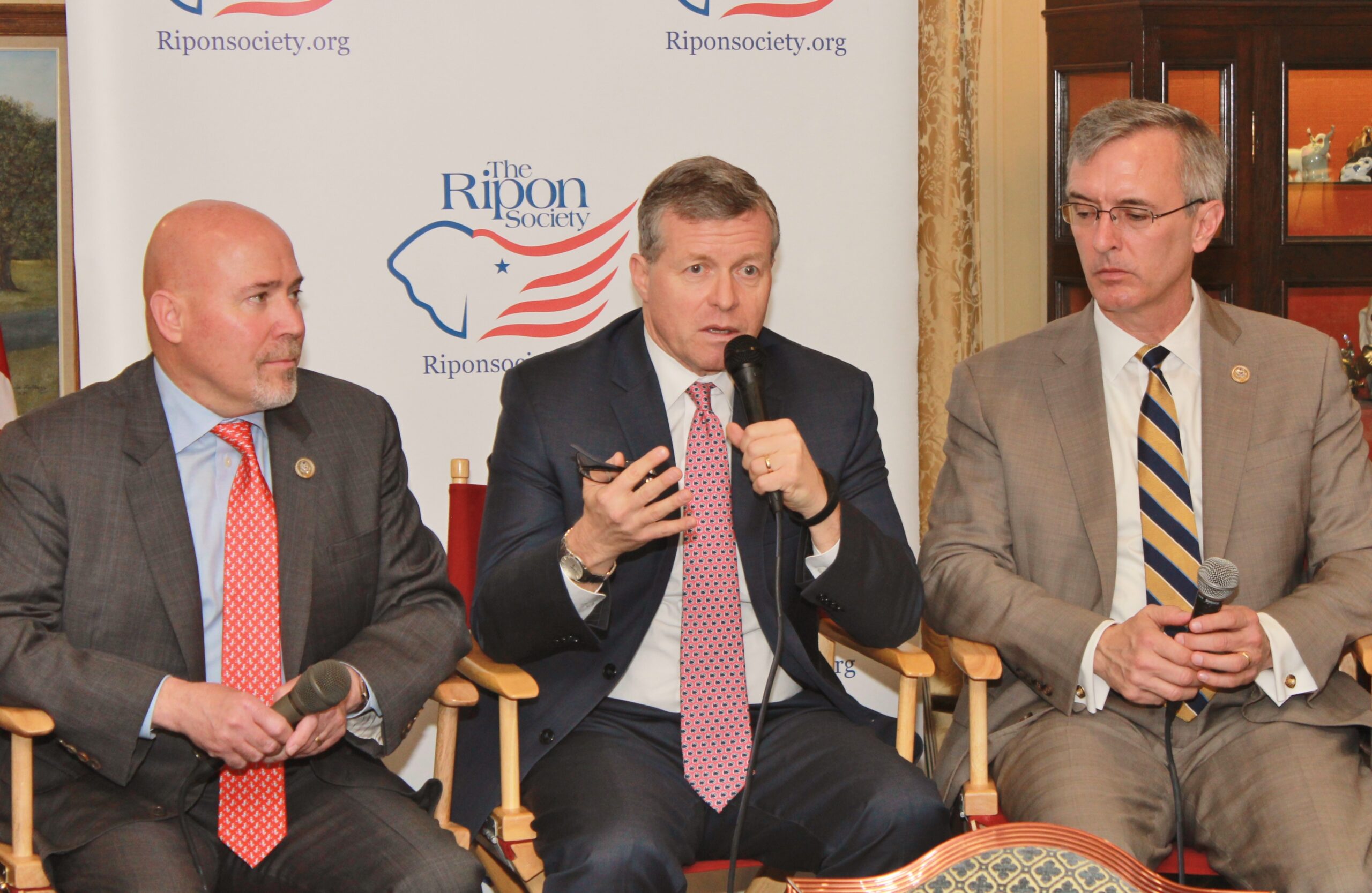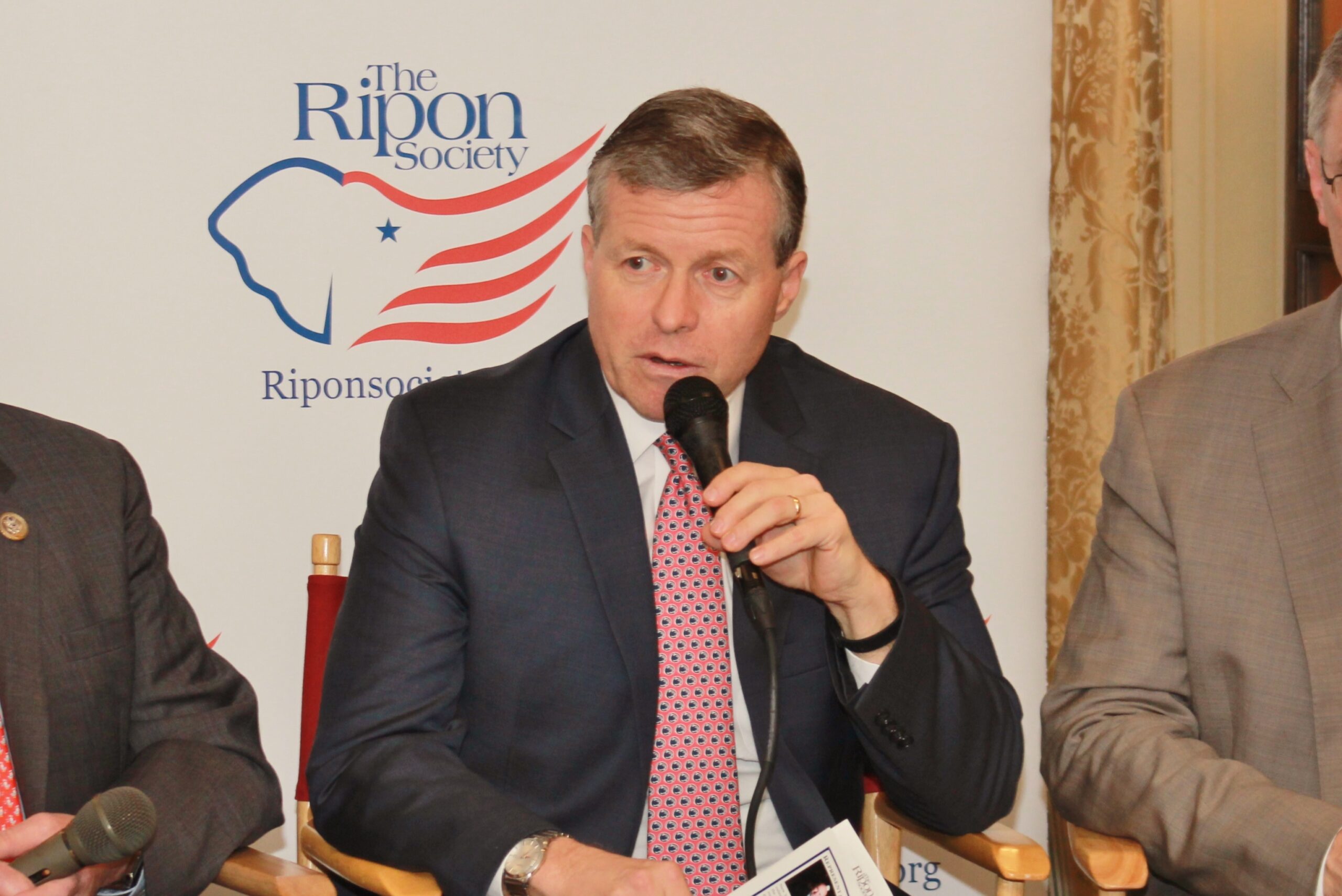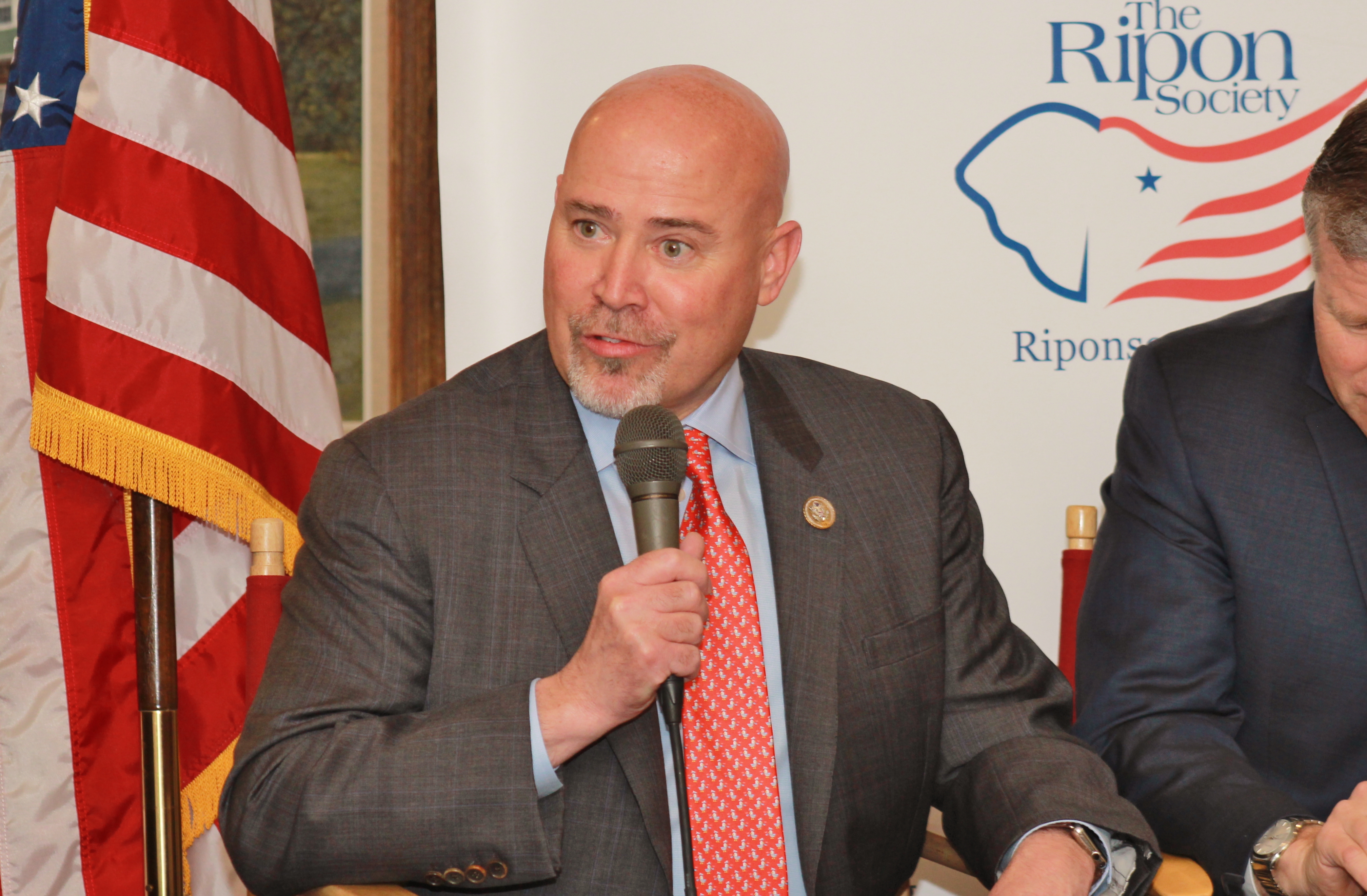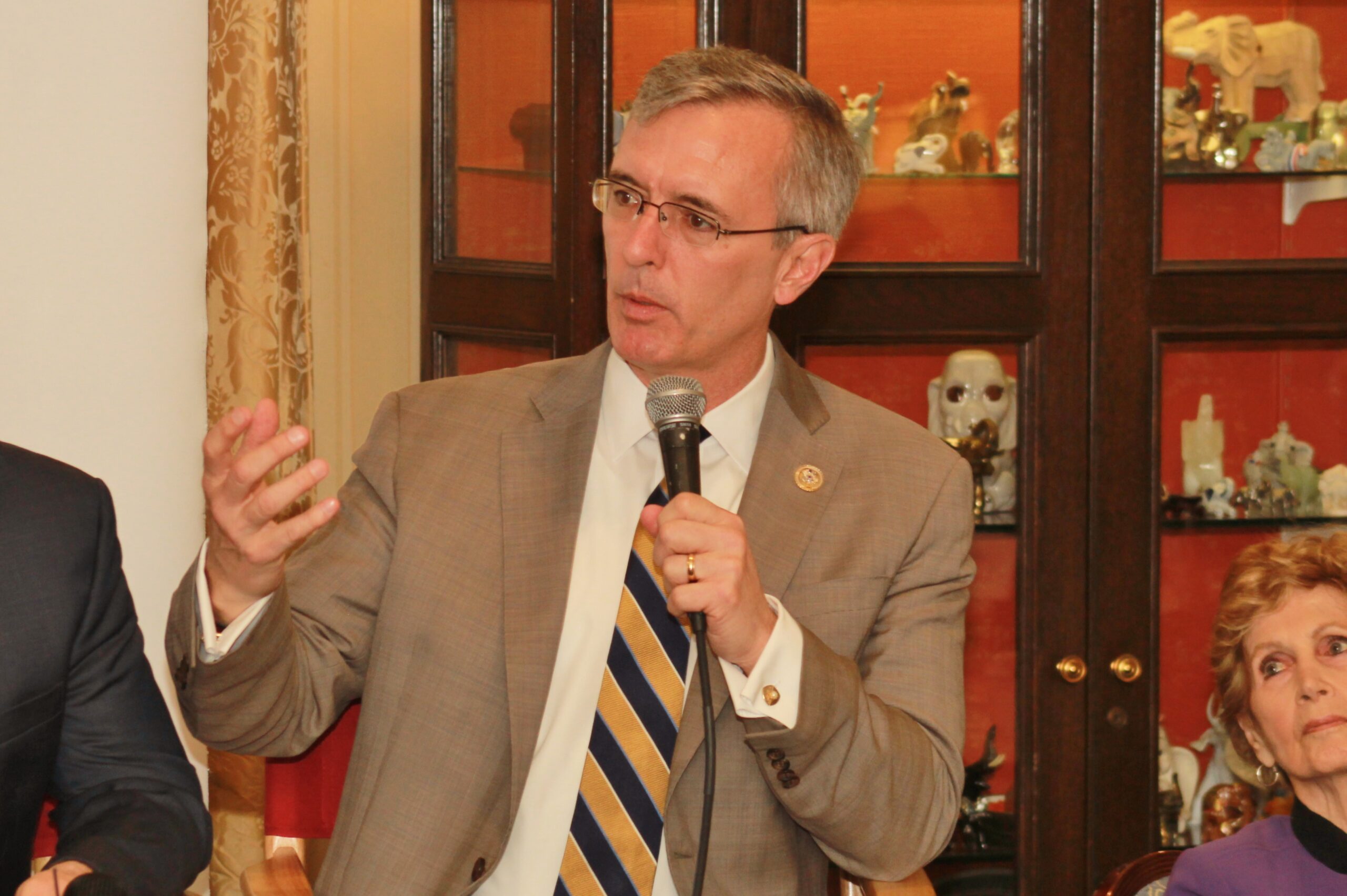 Dent, MacArthur & Katko share their thoughts on the course of the health care debate
Dent, MacArthur & Katko share their thoughts on the course of the health care debate
WASHINGTON, DC — With Congress trying to reach agreement on a plan to repeal and replace the Affordable Care Act, The Ripon Society held a breakfast discussion yesterday morning with three Representatives from the House Tuesday Group, a bloc of more than 50 center-right Republicans who are growing in influence and playing an active role in shaping the health care debate.
The Representatives included John Katko (NY-24), Tom MacArthur (NJ-3), and Charlie Dent (PA-15). Dent – who serves as Co-Chair of the Tuesday Group along with MacArthur — kicked off the discussion by recalling the governing coalitions of Republicans and Democrats that have helped shape policy in Washington in recent years, and why those bipartisan coalitions are now needed to overcome the political dysfunction that is paralyzing our nation’s capital today.
“When we took the majority in 2011,” Dent stated, “we had a governing paradigm where we had a lot of must-pass bills. The Violence Against Women Act, Hurricane Sandy, CR’s, appropriation bills, debt ceilings, budget agreements, fiscal cliffs, omnibus… Whatever it was, there always seemed to be some kind of a coalition. What I always refer to as the governing wing of the party was largely the Tuesday Group, mainstream members, and some other members — Tom Cole, people like that, who weren’t part of our groups.
“But we had a lot of folks. On a good day, I’d say it was probably 85 to 90 members. So we often had these coalitions where we and the Democrats had to pass these bills. And of course, those of us who voted for these bills were often sniped at from our flank, accused of being capitulators, compromisers or something like that. We took a lot of flak for it. Now that we’ve moved onto a Republican administration with Donald Trump, I think you move back to a more traditional paradigm.”
 Dent is serving his seventh term in Congress and has served as Co-Chair of the Tuesday Group since 2006. In this position, he has become a leading voice for centrist Republicans on Capitol Hill, and has established a reputation as a pragmatic lawmaker who is focused not on ideology, but on achieving results.
Dent is serving his seventh term in Congress and has served as Co-Chair of the Tuesday Group since 2006. In this position, he has become a leading voice for centrist Republicans on Capitol Hill, and has established a reputation as a pragmatic lawmaker who is focused not on ideology, but on achieving results.
To that end, he expressed hope that Republicans this year will focus on legislation that can be approved by both chambers of Congress, and readily supported by those in the center of the political spectrum, not just those on the extremes.
“I think there will be a lot of hesitation to advance bills that have no chance of going anywhere in the Senate,” Dent observed. “The thinking has been that if you passed the bill as conservatively as you can, then it will go to the Senate and come back less conservative. But what we saw over the last six or seven years is that when we do that, we found that those of us in the center-right were giving power to the people on the far right who weren’t going vote for the bill on the rebound. That was always a big problem. And I don’t think that business model is going to work going forward. Because we’re now talking about an energized Democratic Party, and these votes are now very real for a lot of our members.”
“If I were advising the Administration on health care and some other issues, we’re going to have to start working from the center out, rather than what we’ve seen so far. Infrastructure is the next issue we ought to tackle. I realize tax reform is probably on the agenda, and we’re probably going to have to marry tax reform and infrastructure together at some point. Infrastructure lends itself easier to a bipartisan resolution than tax reform.
“We know it’s hard. I think to a certain extent we may have set ourselves up this year to unrealistically high expectations. I heard a lot of people talking earlier in the year about when we were going to get health care, tax reform, and infrastructure done. I just said, ‘Wow.’ If you have any of those this year, that would be a major achievement. To say we’ll get all three, I think is a bit unrealistic.”
 MacArthur agreed, and opened his remarks by talking about his background in business, his approach to negotiating, and why he believes the health care debate at this point is not just about substance, but saving face.
MacArthur agreed, and opened his remarks by talking about his background in business, his approach to negotiating, and why he believes the health care debate at this point is not just about substance, but saving face.
“I grew up in the insurance field and started on the service side,” the New Jersey Republican stated. “I investigated insurance claims in the housing projects. That’s how I started my career. I remember the very first accident that I ever investigated was an auto accident. Two cars hit each other in the intersection — pretty simple. And I had to interview two witnesses. They could have been from different planets based on what they described to me. Two disinterested witnesses saw and heard the exact same thing and described it to me in completely different terms. I went on to spend my whole career negotiating. I negotiated insurance claims and then I got into management, negotiating contracts with customers. Then I acquired a company and we grew from 100 people to about 6,000 people today. We grew all over the country, and I acquired companies. It was a constant negotiation. And there were three things that really settled in my mind about negotiation.
“One is perspective – the two witnesses who see it differently. So when I deal, for example, with the Freedom Caucus, I start with an understanding that they have a different perspective. And I’m talking about the ones that are in good faith. Look, there are people in Congress that may not be acting in good faith. But there are loads of people who are acting in good faith who just have a different perspective. The second is you stay focused on the big picture. I never got everything I wanted in a negotiation, so I would try to identify what were the most important things I cannot move forward without. I was willing to let go of nearly everything else if it helped the other person save face or accomplish their goals. And that’s the third thing — face. We’re actually at a place in these health care negotiations that may be more about saving face than about the substance of the health care bill. I’m not saying the substance doesn’t matter. But it’s about saving face.”
MacArthur — who is serving his second term in Congress and first term as Co-Chair of the Tuesday Group — spent nearly three decades in business before his election in 2014. In his remarks yesterday, he spoke not just about his approach to negotiating, but what the negotiations have achieved thus far.
“There was going to be a tax on employer-sponsored health care plans in the top 10% which would have created a race to the bottom for companies to get out of being in the top 10%,” he stated. “I thought that was a terrible mistake. We got that out of the bill. Then we also wanted to make sure that everyone on Medicaid expansion would be able to stay there permanently, so that we didn’t either do a bait-and-switch with the states or pull the rug out from under those individuals. We got that done. And then we added successively in three buckets $160 billion — $60 billion for disabled and elderly in Medicaid, $85 billion for the 50-64 age band in the marketplace, and $15 billion for maternity care, mental health care, and addiction recovery. All of those things brought me to a ‘yes’ because I was a part of negotiating that. And I feel that if you negotiate in good faith and get most of what you need, it’s time to say ‘yes.’”
 Katko echoed his colleagues’ remarks, and recalled his own decision to run for Congress in 2014 and his belief that partisan divisions in Washington have become too entrenched.
Katko echoed his colleagues’ remarks, and recalled his own decision to run for Congress in 2014 and his belief that partisan divisions in Washington have become too entrenched.
“I was sick and tired of the partisan gridlock,” he stated. “I wanted to do something about it. It’s my nature to want to attack problems. So I come to Congress, and it was not shocking, but eye-opening to see just how entrenched both sides were against each other, and how there were entrenched factions within our own party. And I wanted to do something about that. One of the reasons I got involved with the Tuesday Group was I firmly believe you cannot solve the long-term problems of this country unilaterally. You cannot do it without working with the other side or at least making some attempts to work with the other side. The Tuesday Group is a very important component of that. Not because we meet with Democrats on a regular basis, but because we try to look at the bigger picture and understand that passing a partisan bill that we know is going to die in the Senate is not really helping anyone.”
The Ripon Society is a public policy organization that was founded in 1962 and takes its name from the town where the Republican Party was born in 1854 – Ripon, Wisconsin. One of the main goals of The Ripon Society is to promote the ideas and principles that have made America great and contributed to the GOP’s success. These ideas include keeping our nation secure, keeping taxes low and having a federal government that is smaller, smarter and more accountable to the people.



